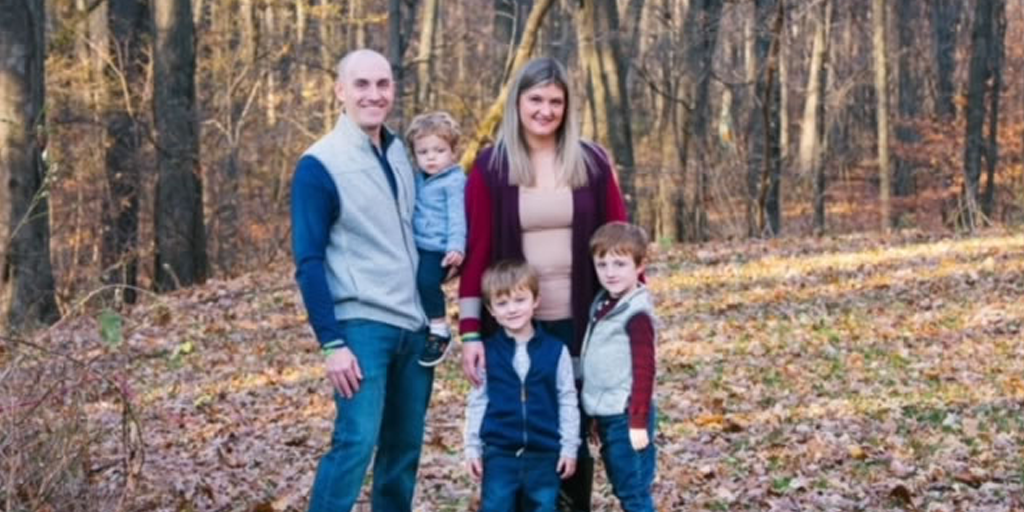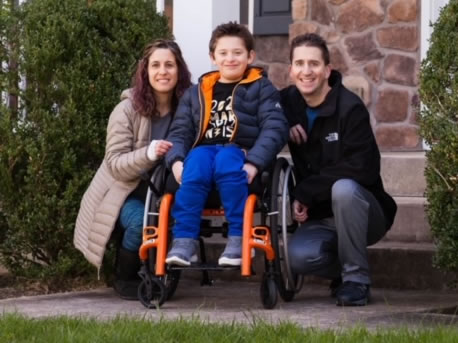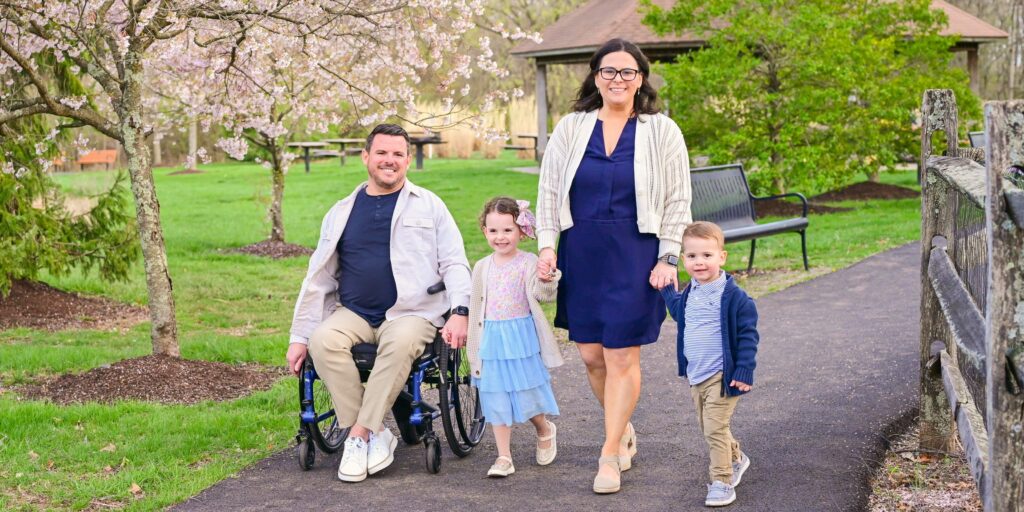
Parent Pressure
By Shaila Wunderlich | Friday, May 7, 2021
Since her son Jackson’s diagnosis at 3 months old, Marcie Epstein has always maintained a grounded perspective on his neuromuscular disease. Jackson, now 12, first showed signs of central core disease (CCD) at 5 weeks. “This is how Jackson was born,” Marcie says. “This is his life.”
Still, her healthy outlook occasionally gets put to the test. Sometimes, it’s the demanding pace of Jackson’s daily routine that gets overwhelming — from getting him up, bathed, fed, and on the school bus each morning, to his rotating schedule of therapies. Watching him go through 10 hip surgeries since he was 6 months old has been particularly wrenching. Lately, it’s her son’s preteen mood swings making life more tense.
It’s a fact: Parents of children with chronic medical issues report higher rates of stress than their peers. Also known: The best predictor of a child’s emotional function and coping skills are the parents’ emotional function and coping skills. “Taking care of yourself is good for yourself and your child,” says Natalie Truba, PhD, a psychologist at the MDA Care Center at Nationwide Children’s Hospital in Columbus, Ohio.
When raising a child with a neuromuscular disease, there are additional challenges that can cause added stress. You should know that there are resources, professionals, and systems in place to help prevent that stress from harming your own physical and mental health.
Assemble a support team
Support comes in many forms — from in-home to on-site; professional to personal — and it begins the moment of your child’s diagnosis. During the first few appointments at an MDA Care Center, your family is matched with a team of physicians, therapists, nutritionists, and mental health professionals whose job it is to guide you through the ever-evolving phases of your child’s journey.
“Whether it’s a physical or occupational therapist to help with mobilization, or a social worker to assist with in-home resources and set-up, simply knowing this team exists often brings immediate relief to parents overwhelmed by the shock of a recent diagnosis,” says Alison Sobawale, MSW, LISW-S, a clinical social worker at Nationwide’s MDA Care Center. She aims to see patients and their families at least once a year and checks in with them via phone as often as necessary. “I talk to families frequently as psychosocial needs arise,” she says.

Epstein family
Once your professional team is in place, begin building your home team. This support group typically includes relatives, friends, hired caregivers, teachers, and coaches. Educating and arming its members with specific information will increase the likelihood of success and lessen the burden on you. Decide on an age-appropriate explanation of your child’s diagnosis, and let the whole team know about it, so they can use it in school and other public settings (i.e., “His muscles get tired faster than yours, but he still has feelings and thinks the same way you do”). Research shows that classmates of a child with a disability will defend and help the child more if they understand their condition.
Parents of kids with Duchenne muscular dystrophy (DMD) love the book “Dan and DMD” for this purpose. This illustrated children’s book takes kids through the daily life of a young boy with DMD.
At Jaxon Hunt’s Michigan elementary school, the physical therapist read the book to Jaxon’s first-grade class then had his classmates navigate an obstacle course wearing heavy firefighter boots. “She told them, ‘This is what it feels like when Jaxon walks,'” says his mom, Chelsea. “He came home so excited to tell me about it, which made me feel so much better in turn.”
Talk to friends and peers
“Having your own people and space to process your experience is invaluable,” Dr. Truba says.
Your own people might include friends, siblings, or anybody who’s a good listener. “I like talking to people who aren’t overly concerned or always feeling like they need to do something,” Marcie says.
Chelsea likes to take time to check in with her husband after especially hard days. “I’ll wait until Jaxon’s in bed, and then Jacob and I will sit together and say, ‘That was really sad what happened today. That was really hard.'”
Fellow parents of kids with neuromuscular disease also can be incredibly supportive, as they understand your unique journey better than anyone. MDA’s National Connections Program helps people in the neuromuscular disease community connect with other individuals living with neuromuscular disease, parents, caregivers, spouses, or siblings. (To join the program, contact MDA’s Resource Center at 833-ASK-MDA1 or resourcecenter@mdausa.org.) Some
hospitals also have programs to help families connect to others going through similar experiences.
These days, many parents turn to social media to find peers. Facebook groups devoted to specific neuromuscular diseases can be great spaces for venting frustrations, asking questions, and receiving empathy and compassion. Be aware, though, of the fine line between healthy venting and toxic negativity. “A good rule of thumb is to identify two to three positives for every negative you express,” Dr. Truba says. “So, you want to vent about how long it takes your son to put his socks on? Follow it up with what a great sense of humor he has about it and how far he’s come in school.”
Empower your child
Empowering your child to do as much as they can, for as long as they can, not only minimizes your own workload but also avoids what’s known as “learned helplessness.” Set small, achievable goals, and watch as your child’s independence and self-esteem build over time. Marcie frequently reminds Jackson of how he’s progressed from gait trainers to manual wheelchairs and crutches to sitting on his own. “People look at him now and have no idea how far he’s come,” she says.
It’s also a good idea to help your child find activities that work with their abilities. Marcie enrolled Jackson in sled hockey at age 5, and he still enjoys the sport. “It’s been wonderful for his self-confidence, and it’s been great for my own independence, knowing that he’s OK out there by himself,” Marcie says.
Set boundaries
Boundaries and limits (and consequences for violating them) are as important to children with neuromuscular disease as they are to any child — perhaps more, as children with restricted mobility naturally are more dependent on their parents. “Set limits for your child’s behavior,” Dr. Truba says. “Limit the number of times they can ask the same question, for example, or the amount of time you’ll engage with them about their worries.”
Allow plenty of breaks for yourself and your child, and know when it’s time to walk away. “Saying to your child, ‘We’re going to take a breath now and think about this further’ is an appropriate and healthy response when you find yourself in an overly stressful situation,” Alison says. “It also sets a good example for your child as to how to handle conflict.”
It’s a good idea to step away if you or your child is feeling a sense of helplessness, rising tempers, or lashing out. “Set a timer and plan to come back and talk about what happened with a clear mind,” Alison says.
Schedule fun breaks for yourself, too. Whether it’s 30-minute Zoom calls with friends or an annual trip without the kids, it’s crucial to have regularly scheduled moments of release. “Having something to look forward to is really helpful to me,” Marcie says. “It gives me something to hold on to.”
Shaila Wunderlich is a St. Louis-based writer with more than 20 years’ experience in the publishing industry.
TAGS: MDA Care Centers, MDA Resource Center, Mental Health, Parenting, Relationships, Resources
TYPE: Featured Article
Disclaimer: No content on this site should ever be used as a substitute for direct medical advice from your doctor or other qualified clinician.




